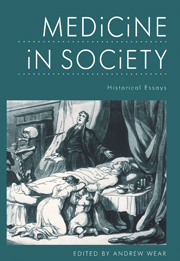Book contents
- Frontmatter
- Contents
- List of contributors
- Introduction
- Healers in the medical market place towards a social history of Graeco-Roman medicine
- Medicine and society in medieval Europe, 500-1500
- The patient in England, c. 1660–c. 1800
- Making sense of health and the environment in early modern England
- Medicine in the age of Enlightenment
- The rise of the modern hospital in Britain
- Medical practitioners 1750–1850 and the period of medical reform in Britain
- Public health, preventive medicine and professionalization: England and America in the nineteenth century
- Madness and its institutions
- From infectious to chronic diseases: changing patterns of sickness in the nineteenth and twentieth centuries
- Providers, ‘consumers’, the state and the delivery of health-care services in twentieth-century Britain
- The implications of increased life expectancy for family and social life
- Index
Providers, ‘consumers’, the state and the delivery of health-care services in twentieth-century Britain
Published online by Cambridge University Press: 13 January 2010
- Frontmatter
- Contents
- List of contributors
- Introduction
- Healers in the medical market place towards a social history of Graeco-Roman medicine
- Medicine and society in medieval Europe, 500-1500
- The patient in England, c. 1660–c. 1800
- Making sense of health and the environment in early modern England
- Medicine in the age of Enlightenment
- The rise of the modern hospital in Britain
- Medical practitioners 1750–1850 and the period of medical reform in Britain
- Public health, preventive medicine and professionalization: England and America in the nineteenth century
- Madness and its institutions
- From infectious to chronic diseases: changing patterns of sickness in the nineteenth and twentieth centuries
- Providers, ‘consumers’, the state and the delivery of health-care services in twentieth-century Britain
- The implications of increased life expectancy for family and social life
- Index
Summary
Introduction
Debates about twentieth-century medicine have been characterized above all by an increased preoccupation with the delivery of health-care services. Underlying this preoccupation has been the fundamental assumption that personal health care delivered by a doctor to a patient, whether in the home or in a hospital, is a worthy endeavour that should be widely available. The belief in the progressive power of scientific medicine to cure has been largely shared by policy makers and consumers, as well as by the medical profession itself. In turn, this belief has sustained the view first, that doctors are the best people to determine the content of medical services and second, that developments in medical care should be made available to as many people as possible. The latter view has necessarily involved greater collective effort and a larger role for the state. It is only very recently that faith in the capacity of the medical profession and state medical services has begun to falter. During the 1980s, support for the medical profession in its task of making us healthier and for an increasing role for the state in making medical services more widely available has been questioned.
While the twentieth century has thus been marked by an overarching consensus as to the value of scientific medicine, below this there has nevertheless been considerable room for conflict. The interests of the three major groups of protagonists – the medical profession, ‘ consumers ’ and the state – have often differed, and these conflicts have become of paramount importance when faith in the medical profession and in the role of the state in providing medical care are called into question.
- Type
- Chapter
- Information
- Medicine in SocietyHistorical Essays, pp. 317 - 346Publisher: Cambridge University PressPrint publication year: 1992
- 6
- Cited by



